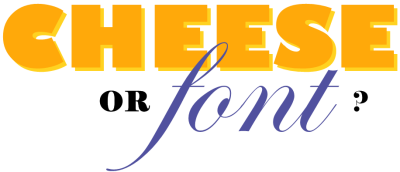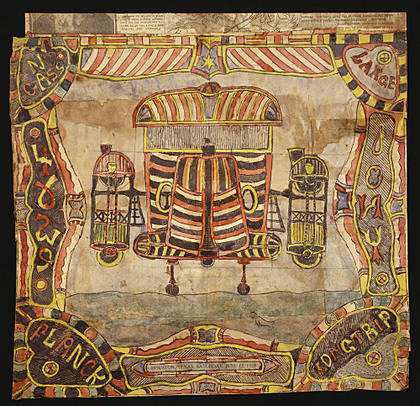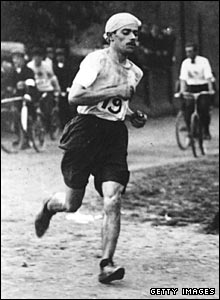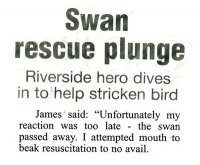As a great enthusiast for the postprandial nap, which I like to think of as a mark of civilised behaviour, I was somewhat alarmed to read the advice of Dr Andrew Boorde, writing in his Dyetary of Helth in 1542: “Whole men of what age or complexion soever they be of, should take their natural rest and sleep in the night, and to eschew all meridial sleep. But, an need shall compel man to sleep upon his meat, let him make a pause, and then let him stand, and lean and sleep against a cupboard.”
Category Archives: Things I Have Learned
Mr Key Is Transfixed
Mr Key hereby advises that for the foreseeable future there may be very, very few postages at Hooting Yard, as he will be spending his every waking hour playing what must be the finest game ever devised. Yes, readers, ’tis Cheese Or Font?

Eternal gratitude to David Thompson for making it known.
A Regalia For Princes And Grandees
“The quality is moderately hot, proper for winter or summer. The drink is declared to be most wholesome, preserving in perfect health until extreme old age. The particular virtues are these: It maketh the body active and lusty. It helpeth the headache, giddiness and heaviness thereof. It removeth the obstructions of the spleen, it is very good against the stone and gravel. It taketh away the difficulty of breathing, opening obstructions. It is good against lippitude distillations, and cleareth the sight. It removeth lassitude, and cleanseth and purifieth acrid humours and a hot liver. It is good against crudities, strengthening the weakness of the stomach, causing good appetite and digestion, and particularly for men of corpulent body, and such as are great eaters of flesh. It vanquisheth heavy dreams, easeth the brain, and strengtheneth the memory. It overcometh superfluous sleep, and prevents sleepiness in general, a draught of the infusion being taken; so that without trouble whole nights may be spent in study without hurt to the body. It prevents and cures agues, surfeits, and fevers by infusing a fit quantity of the leaf, thereby provoking a most gentle vomit and breathing of the pores, and hath been given with wonderful success. It (being prepared and drunk with milk and water) strengtheneth the inward parts and prevents consumptions. It is good for colds, dropsies, and scurvies, and expelleth infection. And that the virtues and excellencies of this leaf and drink are many and great is evident and manifest by the high esteem and use of it (especially of late years) by the physicians and knowing men of France, Italy, Holland, and other parts of Christendom, and in England it hath been sold in the leaf for six pounds, and sometimes for ten pounds, the pound weight; and in respect of its former scarceness and dearness, it hath been only used as a regalia in high treatments and entertainments, and presents made thereof to princes and grandees till the year 1657.”
From a 17th century pamphlet on the subject of tea, quoted in Byegone England : Social Studies In Its Historic Byways And Highways by William Andrews, (1892). He also quotes from an Edmund Waller poem, thus: “The Muses’s friend, tea does our fancy aid / Repress those vapours which the head invade”.
Ritual Goat Sacrifice : Latest News
Last week I remarked on the brouhaha that would be stirred were a British (as opposed to a Japanese) Prime Minister to be attacked by a killer robot. I am now trying to cope with the idea of our political masters indulging in ritual goat sacrifice – perhaps not every day, but quite often. According to today’s Guardian:
Pakistan’s president, Asif Ali Zardari, has found solace in an unusual form – the ritual slaughter of goats.
Zardari has a black goat killed every day at his Islamabad house to ward off “evil eyes” and protect himself against “black magic”, according to a report in Dawn, Pakistan‘s paper of record.
Spokesman Farhatullah Babar confirmed the president practises sadiqa, or the sacrifice of an animal whose meat is distributed among the poor. “I have seen it been done. Not exactly every day, but quite often, yes,” he told the Guardian.
But he denied its purpose was to fend off malevolent spirits. “The main belief is that this practice invokes the pleasure of God. The corollary is that bad things will not happen, of course, but that’s a matter of interpretation,” he said.
I don’t see the slaughtering of goats as Gordon Brown’s thing, but it would make sense with someone like Geoff Hoon. He looks like a goat-killer, as does his partner in that recent failed coup, Patricia Hewitt. I expect the failure was due to their being so busy tippy-tapping conspiratorial drivel into their Blackberries that they forgot to sacrifice a goat at the propitious time. As for Miliband 1 and Miliband 2, they strike me more as the type to interpret the bloody entrails of ritually slaughtered poultry.
The Sky Over Pointy Town : Standard View

As part of our exciting series Meteorologically Significant Pictures From Pointy Town And Thereabouts, here is what boffins describe as the “standard view” of the sky, if one is looking up into the firmament when standing slap bang next to the horse trough in Chris De Burhg [sic] Square. Apparently, there are occasional days when the sky looks a tiny bit less threatening, but they are few and far between in the span of years allotted to most of us, including tortoises.
Deluge-Vision courtesy of Book Patrol
How To Spot A Criminal Maniac
“A few months after my father had diagnosed this case, an assault of the same nature was committed on another little girl living in the same house. In this case, however, the victim survived and was able to point out the criminal – an imbecile, afflicted with goitre, stammering, strabismus, hydrocephaly, trochocephaly, and plagiocephaly, with arms of disproportionate length, the son and grandson of drunkards, who confessed the double crime and entreated pardon for the ‘trifling offence’ since he had always done his duty and swept the staircase, even on the day he committed the crime.”
From Criminal Man, According To The Classification Of Cesare Lombroso Briefly Summarised By His Daughter, Gina Lombroso-Ferrero (1911). This was No. 27 in “The Science Series” edited by Edward Lee Thorndike, PhD, and F E Beddard, MA, FRS. Other titles included Fatigue by A Mosso, Nervous And Mental Hygiene In Health And Disease by August Forel, Mosquito Life by Evelyn Groesbeeck Mitchell, and The Interpretation Of Radium by F Soddy.
Sonora Aero Club
“Detailed and annotated mixed-media images of heroic flying machines – Barnum and Bailey, Buck Rogers and Jules Verne all stirred together – mazes of exotic detail, circus-tent gas-bags, bicycle wheels, belts and pulleys – crazily painted pods shaped like the space shuttle boosters…”
The work of Charles Dellschau, a Prussian butcher resident in Texas, and member of the Sonora Aero Club secret society, obsessed with airships. Read a potted biography here, and look at some gorgeous pictures here. And for the next few weeks, those of you in or visiting London can see original works at the Museum Of Everything.

Those Cursed Scotch Pebbles
“I am sorry there are such occasions to clean your pebbles; you must make use of the powder to them by putting it in anything of substance, wherein it will not swim a-top of the water.”
The father, feeling unwell, frequently took water gruel. This was a proper vehicle for the powder.
“On Sunday morning, I again examined Mr Blandy. He seemed much relieved, but, on viewing his fundament, I found it almost surrounded with gleety excoriations and ulcers.”
“I always thought there was mischief in those cursed Scotch pebbles.”
Four extracts from an account of the case of Mary Blandy, given in Tales Of The Newgate Calendar by Rayner Heppenstall (1981)
Killer Robots!
I was startled, to say the least, when I read that, some years ago, the Prime Minister of Japan was attacked and almost slain by a deranged killer robot. Imagine the kerfuffle if such a thing had happened to one of our own past Prime Ministers, Harold Macmillan, say, or Neville Chamberlain. (It was Lloyd George who remarked that Chamberlain had “a wrong-shaped head”. Lord knows what he would have made of the bonce of a killer robot.)
Alas, it appears from the video kindly posted by Mr Eugenides that the PM-robot encounter was not quite as blood-curdling as we are led to believe. This just goes to show that you simply cannot trust most of what you read, either in newspapers or on the interweb. One shining exception, of course, is Hooting Yard. I am regularly discomfited when it is suggested that I make a lot of this stuff up, whereas I spend untold hours engaged in rigorous, yes, damned rigorous research to bring you the nuggets of wisdom contained herein. Only yesterday, after To Vange! was posted here, I had to put up with mutterings about the allegedly fictional nature of Vange Well No. 5, for goodness’ sake! Get a grip, readers. You will certainly never find me babbling on about killer robots attacking veteran politicians. Cows attacking Blunkett, yes. There is a difference.
Naming Names
“Odd names crop up in all Roussel’s texts, and we know he had extreme difficulty in arriving at each final choice. Leiris records that he sometimes asked Eugène Vallée, the overseer at the Lemerre printing house, to fill in the blanks or initials he had left in the manuscript, but then invariably replaced Vallée’s suggestions with other names. La Seine contains an especially eccentric range: Ernest Arson, Buss, Bopp, Burc, Bals, Roolf, Pauline Bux, Orry, Raga, Saerck, Èche, Renée Wunster, Lay… The manuscripts offer no indication as to how he arrived at these names.”
Footnote in Raymond Roussel And The Republic Of Dreams by Mark Ford (2000)
Eggs Soaked In Tea
Nowadays, if I understand these things correctly, long distance runners rehydrate themselves by glugging lots of water during a race. Such namby-pamby methods were alien to the doughty amateurs who ran the twenty-six mile Marathon at the 1908 Olympic Games in London. Among their refreshments along the route were muscatel grapes, calves’ foot jelly with lemon, new-laid eggs soaked in tea, orange segments, brandy, champagne, and small doses of strychnine.
So I learned from The First London Olympics 1908 by Rebecca Jenkins (2008)

Mum
When asked how her children address her, the novelist A S Byatt replied “They call me A S Byatt”. This seems to me to be parenting of a decisively brilliant kind. It is rather late in the day, but I will demand that the not-so-tiny Key nippers call me “Mr Key”.
Meanwhile, if ever I bump into A S Byatt – and I well might, in the bookish labyrinth of the London Library – I am going to call her “Mum”.
Wit And Wisdom
‘he kept on saying things one wished one had said oneself. Of a certain mushy spiritual writer named Idries Shah: “These books are a great deal harder to read than they were to write.” Of a paragraph by Herman Wouk: “This is not at all bad, except as prose.” He once said to me of the late Teddy Kennedy, who was then in his low period of red-faced, engorged, and abandoned boyo-hood, that he exhibited “all the charm of three hundred pounds of condemned veal.” Who but Gore could begin a discussion by saying that the three most dispiriting words in the English language were “Joyce Carol Oates”? In an interview, he told me that his life’s work was “making sentences.” It would have been more acute to say that he made a career out of pronouncing them.’
Christopher Hitchens on Gore Vidal, in a piece here lamenting that latterly the great man has turned into a crackpot.
Death Of A Swan

The Moorhen Appreciation Society
The most popular search terms that bring unwitting Interwebshire hikers to the gates of Hooting Yard remain bees, Googie Withers, and lobster diagram, but I was pleased to note a new entrant yesterday. Two people arrived here after typing in moorhen appreciation society. Well, we know all about moorhens here, and we appreciate them too, so I trust the visiting hikers went away suitably gleeful. Meanwhile, pursuing my own researches, I discovered the existence of the Moorhen Appreciation Society on Facebook Facecloth. I was charmed, to say the least, by its single item of “news”, which is “I saw a moorhen this morning”. I cannot say the same for myself, alas, though I did spot a few squirrels, one of which was carrying, in its squirrel-jaws, the shredded remains of a Mars Bar wrapper.
I am fairly sure that Dobson was at one time a member of his local Moorhen Appreciation Society. The out of print pamphleteer joined it for reasons we can only guess at, for as we know the space in the human brain devoted to ornithological matters was in Dobson’s case either utterly vacant or so clogged up the synapses misfired. He was forced to resign his membership when it became clear that he could not tell the difference between a moorhen and a heron, and embroiled the Society in legal entanglements in the bird courts. His pamphlet Well, They Both Have Beaks And Feathers, For Christ’s Sake! (out of print) recounts the whole sorry saga, though it is quite an exasperating read for those of us who are more engaged with the avian world than Dobson was.
